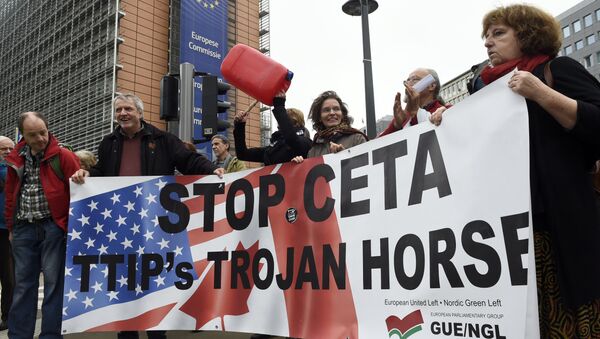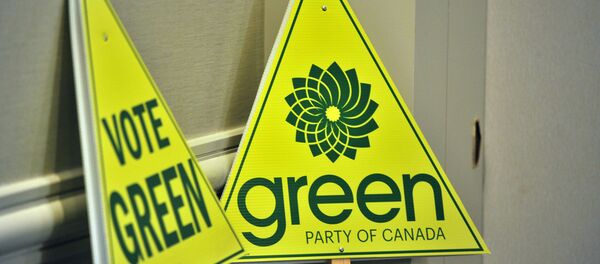Before it is implemented, CETA must still be adopted by the European Union's Parliament. After that, to enter into force, the deal will have to be ratified by all 28 members of the supranational bloc. The controversial agreement aims to establish a free trade zone between Canada and the European Union. Critics of the deal have warned that it would undermine environmental protections, health and safety and workers' rights.
Officials from Belgium's French-speaking region of Wallonia have turned out to be particularly fierce critics of the agreement, nearly blocking it outright before accepting a compromise at the last minute. Even after its passing, amid massive pressure from transnational corporations, lawmakers from the region's parliament have vowed that they may still stop the agreement when they get the chance to vote on its ratification, unless serious changes are made.
Speaking to Radio Sputnik France, Wallonia Parliament lawmaker Frederic Gillot said that there was no question that he and his fellow MPs would continue to resist the agreement. "Essentially, CETA is not a trade agreement, but an agreement on the elimination of all our social, environmental and other standards," he stressed.
In other words, Gillot noted, CETA itself will always carry a greater weight than any documents in its appendix.
At the same time, Gillot warned that experts have already made very clear that agreements like CETA won't be of any benefit to ordinary people –either in Canada or in the EU. "There is an economist named Pierre Kohler from Tufts University; he also works at the UN. In his work, he has demonstrated that this agreement will not create any wealth; on the contrary, wealth will move away from the area of labor and toward capital; that is the main purpose of this kind of agreement!"
Dr. Gus Van Harten, an investment law professor at Canada's York University, also has little good to say about CETA. He told Sputnik that the agreement and others like it are actually little more than a rehash of a failed project from the late 1990s called the Multilateral Agreement on Investment.
"The big Western countries…pushed in the late 1990s for something called the Multilateral Agreement on Investment, which failed. I see this current wave of big mega trade deals, especially the CETA, the proposed TTIP between Europe and the United States, and the Trans-Pacific Partnership as an attempt to get this Multilateral Agreement on Investment in place through these back doors," Van Harten explained.
Accordingly, the professor noted, "from the point of view of institutional analysis, you can see how the public is not given a full opportunity to really scrutinize these deals. The disparity between these powerful protections of foreign investor rights, without any corresponding responsibilities for foreign investors if they don’t respect local standards, on the environment or health or really anything – it's just an incredible gap that these deals endorse."
"In that context, a lot of people feel that the system that already isn't really working in their favor is going to be redesigned even further against their [interests]."
Ultimately, Van Harten stressed that the biggest problem is that even if some EU member state determines at some point in the future that they don't like the agreement, they're trapped. "They can't get out of them because in order to get out, you have to terminate the whole trade agreement, and once it's in place, there will be all kinds of pressure not to do that."
At the same time, the investment law professor said he was heartened by Wallonia's resistance of at least some of the worst elements of the agreement. "The most provocative part of the agreement, which has very little to do with free trade, is the foreign investor protection. That part can't be applied now, and I think it's very likely it never will be applied, because there will be just too much opposition in European countries. So that's the achievement that the Walloons got: they got this reprieve from probably the worst part of the agreement."



